At the WorkHuman Conference in Austin this week, we had the rare opportunity to hear from three of the most powerful leaders in the #MeToo movement. Tarana Burke, who started #MeToo over a decade ago, Ashley Judd, one of the first to speak out against Harvey Weinstein, and Ronan Farrow, who broke the story about the pervasive nature of the problem, were part of a penal moderated by Adam Grant. They discussed the #MeToo movement and what we need to do to create real change. This was the first time the three of them had shared the stage together, and they did not disappoint.
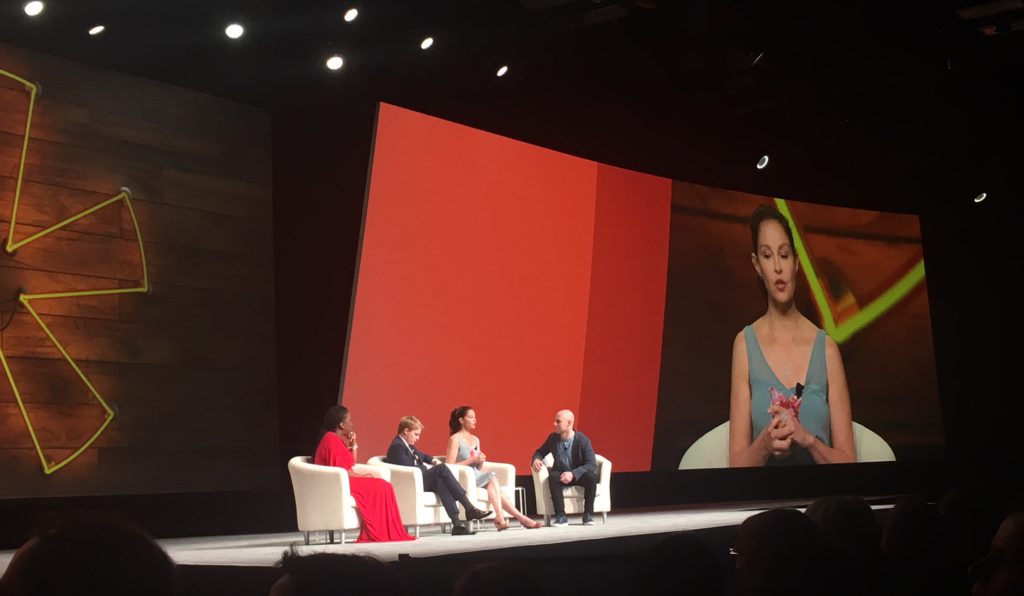
First, let me say that I was overwhelmingly impressed by these three leaders. Their courageous stories, the eloquence with which they spoke about sexual violence, and their ability to make things relevant to an HR audience was extremely impressive.
Now I want to share some of the valuable insights that came up in the panel.
1. When people share their stories, it breaks down barriers and creates empathy and power
Tarana Burke discussed how, as a young woman, she felt like isolated, as though she and Maya Angelou were the only people who had experienced sexual violence. It was as though this sort of thing only happened in books. This feeling changed for her when other adult women survivors became what Tarana calls “interruptors” and showed immense empathy. The interaction shifted from “sorry that happened to you” which creates distance, to understanding.
Knowing that she was not alone helped her to regain some power, and inspired her to share her story. This became an impetus that spread to other survivors, changing people’s lives. We need to encourage people to share.
“We need to get comfortable being uncomfortable” – Ashley Judd
2. We need to tear down the walls of shame for survivors
As Tarana shared, the way we interrupt the patterns of sexual violence is by talking, being vocal, and tearing down shroud of shame for survivors. When the subject is taboo, it makes young people feel complicit in their abuse. When it’s a thing that’s whispered about or kept quiet, it makes the survivor feel as though it’s their fault.
We need to engage survivors from a place of power. They have power – we need to activate it by lifting the veil of shame, talking openly about the truth of sexual violence. We need to provide them with a language to use to discuss their experiences.
I loved Ashley Judd’s language around this: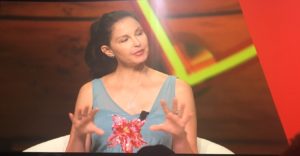
Compassionate witnessing, each of us learning how to listen on a more deep human level. is the fulcrum on which the movement swings.
3. The problems in the entertainment industry also exist in every industry – including yours
As Ronan Farrow interviewed dozens of women and learned more about the abuse happening at the Weinstein company, he also became aware that there are elaborate systems in place that could be utilized by the most powerful and wealthiest men in theis country to silence voices that spoek out against them.
These systems exist everywhere, including the private sector, and they involve people at the top of companies.
In HR, we need to stand up and enforce what’s right, even when the most powerful person in our companies are against it. We need to create culture where people can stand up and speak out. (More on this below).
In Ashley Judd’s words,
“Grow a damn backbone. Be willing to end impunity and do the right thing.”
4. Firing bad men isn’t the answer. We need to change the systems and end complicity
We’ve seen dozens of recent examples of powerful men being fired. This only serves to highlight the levels of complicity in organizations. People knew that this behaviour was happening and did nothing. As Ronan Farrow stated, it’s not just about a few bad apples. It’s about the barrel. The systems are wrong, and we need to change that to create real change.
I couldn’t help but love Tarana Burke’s message around this. She talked about how these firings are not altruistic. People in these companies knew the rumours, saw the bad behaviour, and were complicit. She said:
“You have to create a culture before this stuff happens. How did you hire a person who could come in and do this. What kind of culture are you creating that makes people think it’s okay to show their penis at work?”
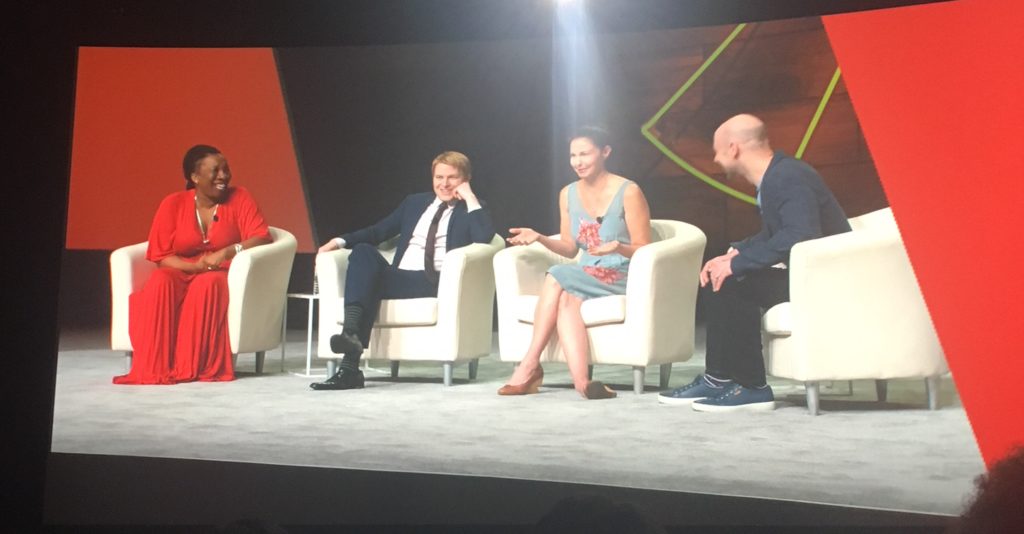
5. DARVO is alive and well in our organizations
Ashley Judd introduced us to DARVO. This is the reaction perpetrators of wrong doing, particularly sexual offenders, may display in response to being held accountable for their actions. It stands for: Deny, Attack, and Reverse Victim and Offender. We see this play out in the news often, with recent examples from the U.S. President.
How often is DARVO the response to allegations against the powerful people in your organization? To counteract this, we need to build institutional courage and individual courage.
6. #MeToo isn’t about an accidental hug in the workplace. It’s about sexual predators and assault.
In recent months, men have begun to speak up and say that they’re afraid to meet with women, to mentor them, or to give an innocent hug to a colleague. One example of this came up at a Tony Robbins event. I found his behaviour and response so disturbing, and have huge admiration for the woman who challenged him on his views (video below).
The panelists were very quick to say that this is not about hugging a colleague or about having genuine interest in someone and asking them for a date (as long as you leave it if they say no). This is about sexual assault and predators.
As we heard from @TaranaBurke @AshleyJudd @RonanFarrow at #workhuman, #MeToo is NOT abt regular interactions at work. It’s abt sexual assault, abuse, harassment. Let’s not muddy waters & allow anyone to use it as an excuse to further ostracize minorities.https://t.co/6UOh1aiFYF
— Pam Ross (@pamelamaeross) April 5, 2018
It’s okay to be human. Ashley Judd talked about the toxic masculinity that most men have grown up thinking is the norm. We need to end that and create new healthy norms around masculinity.
7. Our job as leaders is to excavate the unsaid. – Brene Brown
Tarana Burke started spreading the word that this sort of behaviour was happening in 2004. That’s 13 years before #meToo went viral. It was only once people with more privilege started amplifying the message and talking about this that it got heard.
Although not a part of the panel, Brene Brown shared some wisdom that was so relevant to this conversation. She said that
If you’re not having these conversations because it’s uncomfortable, that is the definition of privilege. Our job as leaders is to excavate the unsaid.
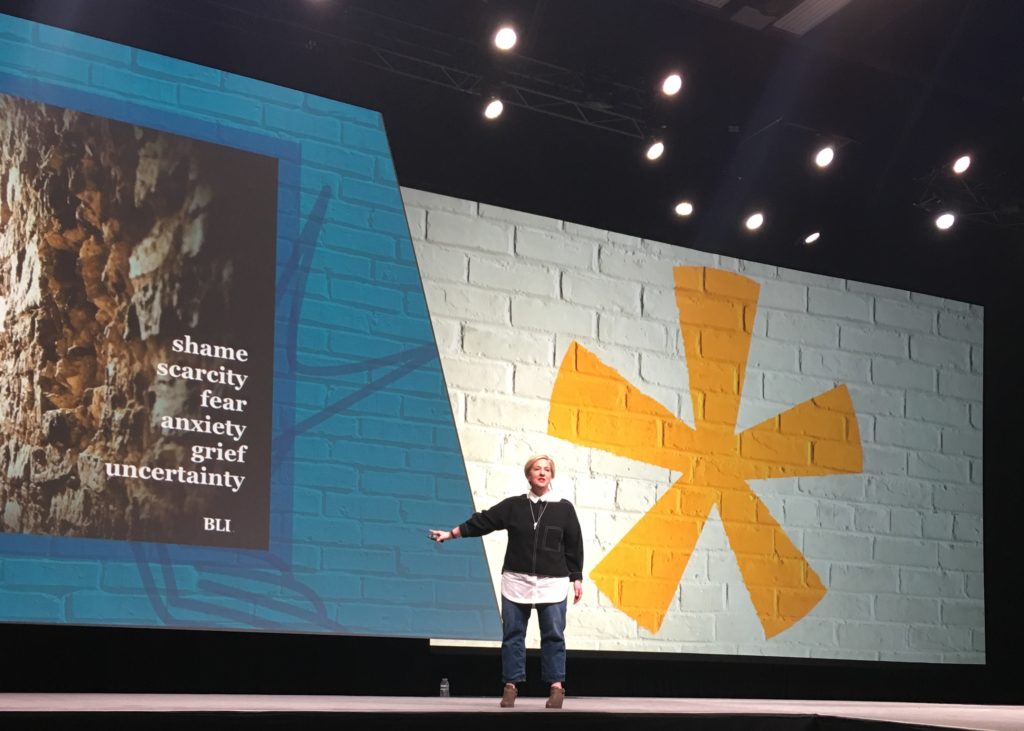
Tarana suggests that we start with marginalized people, making sure they have a voice and safety to speak up, and that we listen. She called out some hard truths on this, including:
Sexual violence knows no race, gender, age, etc but the response to it does.
We need to challenge how we hear, respond to and continue to shine the light on this for all genders and races.
What we can do now
The panelists shared many practical tips that we can put into practice now. Here are a few:
- Hiring and promoting women is absolutely key, because it’s about asymmetrical power – Ashley Judd
- If you’re a survivor who’s afraid to speak up, that’s your choice – and consider who else you may help in the process. As Ronan Farrow shared, the single most improtanat factor for those who did speak out did so because they realized that this can make aor break the fate of another person in this situation.
- If men in your company are saying I’m scared (to mentor women, have meetings with them, promote them, etc), HR pros need to come in and reshape that. In Tarana Burke’s words, “We’re not going to penalize women because men can’t keep their penis in their pants.” Just respect people as human beings.
- The moment we see someone lying about someone who’s had sexual violence / harassment violations, we need to stand up. People who stand up are heroes. They’re important. If you say something, it creates an awkward situation with other people who are covering up, and pushes change.
- Hurry up and listen, but take your time to institutionalize processes and ideas and whatever it takes to change the culture of your company. As the panelists said, we want longstanding change to happen.
- Be prepared with a trauma response for those who have been harassed. How can you ensure they are given compassion, kept safe, and provided with support?
- Get really clear about what your values are. Tarana Burke shared that she has a set of values that have not steered her wrong. Companies that have values and hire people who are invested in those values – who show and prove that they really do believe in them – will be well ahead of those who don’t. When you are clear about your values and have to demonstrate courage, you have a well to dig into for strength.
- Ultimately, we need to change our culture. Ashley Judd suggested that we need to create language and culture to counteract DARVO in organizations. Some of the core pieces to develop are humility, accountability, transparency, individual courage, and cherishing the whistle blower. How many of these principles or competencies exist in your current culture? How can you work to build them?
The #MeToo panel was only part of the amazing WorkHuman experience this year. You don’t want to miss out on this next year. We’ll be in Nashville March 18-21. Stay tuned to my LinkedIn and Twitter accounts for more info and a promo code to join us!

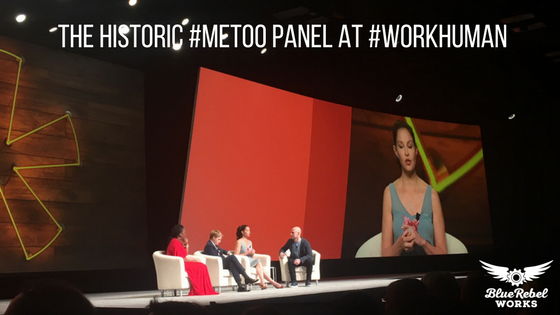
Recent Comments